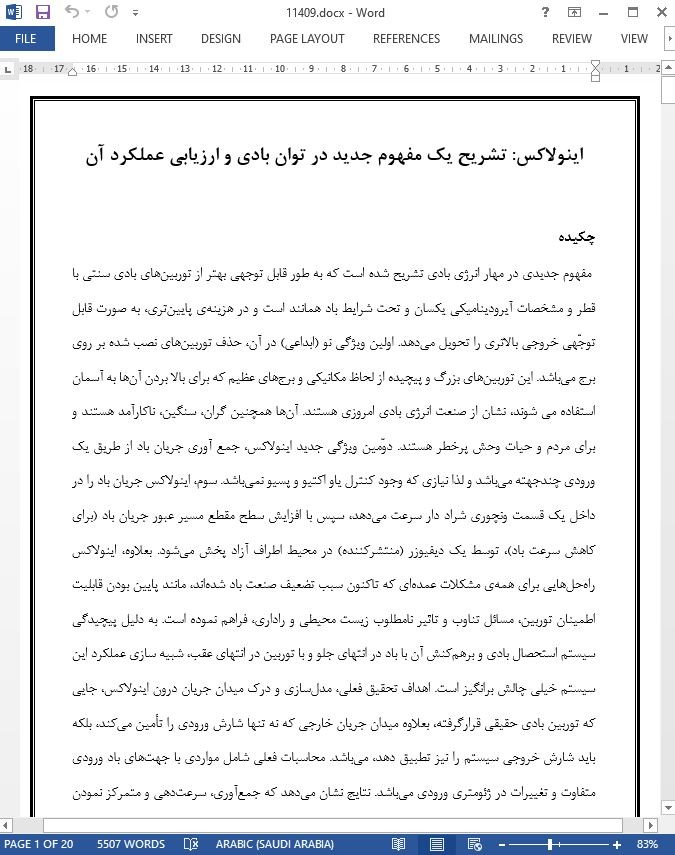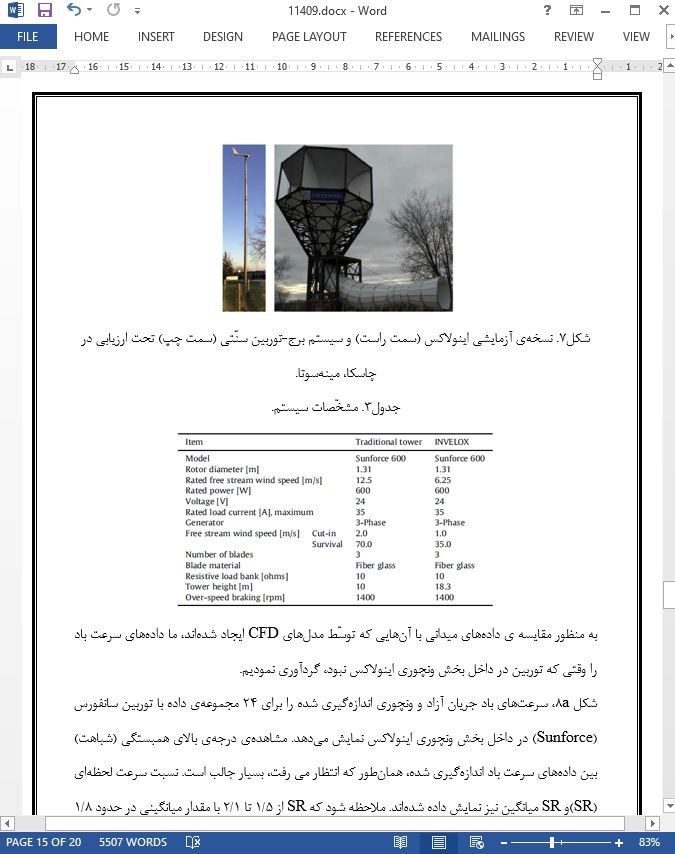
اینولاکس: تشریح یک مفهوم جدید در توان بادی و ارزیابی عملکرد آن
چکیده
مفهوم جدیدی در مهار انرژی بادی تشریح شده است که به طور قابل توجهی بهتر از توربینهای بادی سنتی با قطر و مشخصات آیرودینامیکی یکسان و تحت شرایط باد همانند است و در هزینهی پایینتری، به صورت قابل توجّهی خروجی بالاتری را تحویل میدهد. اولین ویژگی نو (ابداعی) در آن، حذف توربینهای نصب شده بر روی برج میباشد. این توربینهای بزرگ و پیچیده از لحاظ مکانیکی و برجهای عظیم که برای بالا بردن آنها به آسمان استفاده می شوند، نشان از صنعت انرژی بادی امروزی هستند. آنها همچنین گران، سنگین، ناکارآمد هستند و برای مردم و حیات وحش پرخطر هستند. دوّمین ویژگی جدید اینولاکس، جمع آوری جریان باد از طریق یک ورودی چندجهته میباشد و لذا نیازی که وجود کنترل یاو اکتیو و پسیو نمیباشد. سوم، اینولاکس جریان باد را در داخل یک قسمت ونچوری شراد دار سرعت میدهد، سپس با افزایش سطح مقطع مسیر عبور جریان باد (برای کاهش سرعت باد)، توسط یک دیفیوزر (منتشرکننده) در محیط اطراف آزاد پخش میشود. بعلاوه، اینولاکس راهحلهایی برای همهی مشکلات عمده ای که تاکنون سبب تضعیف صنعت باد شدهاند، مانند پایین بودن قابلیت اطمینان توربین، مسائل تناوب و تاثیر نامطلوب زیست محیطی و راداري، فراهم نموده است. به دلیل پیچیدگی سیستم استحصال بادی و برهمکنش آن با باد در انتهای جلو و با توربین در انتهای عقب، شبیه سازی عملکرد این سیستم خیلی چالش برانگیز است. اهداف تحقیق فعلی، مدلسازی و درک میدان جریان درون اینولاکس، جایی که توربین بادی حقیقی قرارگرفته، بعلاوه میدان جریان خارجی که نه تنها شارش ورودی را تأمین میکند، بلکه باید شارش خروجی سیستم را نیز تطبیق دهد، میباشد. محاسبات فعلی شامل مواردی با جهتهای باد ورودی متفاوت و تغییرات در ژئومتری ورودی میباشد. نتایج نشان میدهد که جمعآوری، سرعتدهی و متمرکز نمودن باد امکانپذیر است. سرعت باد افزایش داده شده منجر به بهبود قابل توجّه در توان خروجی میشود. این نتایج منجر به طراحی یک وسیلهی نمایش شد کهداده های واقعی را فراهم کرده که بطور قابل توجّهی انتظارات افزایش توان را تایید نموده است.
5. نتایج
نتایج نشان داده شده که اینولاکس می تواند برای جمع آوری و شتابدهی هوا با استفاده از یک ورودی چند جهته طراحی شود. سیستم حسّاسیّت اندکی نسبت به جهت باد دارد. مقایسهی بین اینولاکس و یک توربین بادی سنّتی تحت شرایط تقریباً مشابه انجام شده است. همیشه طرّاحی یک مقایسهی خوب معنیدار بین دو سیستم متفاوت دشوار است. چنین مقایسهای همیشه به پارامترهای ورودی وابسته است، یعنی متغیّرهای مستقل مورد استفاده برای تأثیر نمودن بر دو سیستم و انتخاب متغییر وابسته یا قید به عنوان معیاری برای مانیتور نمودن یک عمل مشخّص. در حالت ایدهآل در صورت پیدا کردن (آشکار نمودن) تغییر در خروجی متغیّر وابسته، باید انتظار تغییر تنها یک متغیّر مستقل را داشت، در پژوهش اخیر، قطر توربین را یکسان انتخاب نمودیم و در حالی توان خروجی مانیتور می شود، سرعت باد تغییر میکند. چنین مقایسهای بر مبنای اندازهگیریهای میدانی بود، که نشان داد سیستم توربین-اینولاکس به صورت قابل توجّهی انرژی بیشتری از سیستم های توربین-برج، با اندازه توربین یکسان، تولید نمود. اینولاکس پتانسیل نیرومندی دارد و شایستهی توسعهی بیشتر می باشد.
Abstract
A new concept in wind power harnessing is described which significantly outperforms traditional wind turbines of the same diameter and aerodynamic characteristics under the same wind conditions and it delivers significantly higher output, at reduced cost. Its first innovative feature is the elimination of tower-mounted turbines. These large, mechanically complex turbines, and the enormous towers used to hoist them into the sky, are the hallmark of today's wind power industry. They are also expensive, unwieldy, inefficient, and hazardous to people and wildlife. The second innovative feature of INVELOX is that it captures wind flow through an omnidirectional intake and thereby there is no need for a passive or active yaw control. Third, it accelerates the flow within a shrouded Venturi section which is subsequently expanded and released into the ambient environment through a diffuser. In addition, INVELOX provides solutions to all the major problems that have so far undermined the wind industry, such as low turbine reliability, intermittency issues and adverse environmental and radar impact. Simulating the performance of this wind delivery system is quite challenging because of the complexity of the wind delivery system and its interaction with wind at the front end and with a turbine at the back end. The objectives of the present work are to model and understand the flow field inside the INVELOX where the actual wind turbine is located as well the external flow field which not only provides the intake flow but also has to match the exhaust flow of the system. The present computations involved cases with different incoming wind directions and changes in the intake geometry. The results show that it is possible to capture, accelerate and concentrate the wind. Increased wind velocities result in significant improvement in the power output. These results led to the design of a demonstration facility which has provided actual data which verified the significantly increased power expectations.
5. Conclusions
It was shown that INVELOX can be designed to capture and accelerate air using an omnidirectional intake. The system has low sensitivity with respect to wind direction. A comparison between INVELOX and a traditional wind turbine has been attempted under virtually similar conditions. It is always difficult to design a meaningful good comparison between two different systems. Such a comparison is always dependent on the input parameters, i.e. independent variables used to affect the two systems and the selection of the dependent variable or constraint as a criterion to monitor a given function. Ideally one should expect only one independent variable to change at a time while detecting the change in the dependent variable output. In the present work, we selected the diameter of the turbine to be the same and vary the wind speed while monitoring the output power. Such a comparison was based on field measurements which indicated that the INVELOX-turbine system generated significantly more energy than the towerturbine systems with the same turbine size. INVELOX has a strong potential and is worthy of further development.
چکیده
1. مقدمه
1.1. تشریح سیستم استحصال اینولاکس
2. مدل های CFD (دینامیک سیالات محاسباتی)
3. مقایسه مدلها
4. نسخه های آزمایشی میدانی و دادههای اندازه گیری شده
4.1 اینولاکس بدون توربین
4.2 اینولاکس با توربین
5. نتایج
Abstract
1. Introduction
1.1. Description of the INVELOX delivery system
2. CFD (Computational Fluid Dynamics) models
3. Comparison of models
4. Field demos and measured data
4.1. INVELOX with no turbine
4.2. INVELOX with turbine
5. Conclusions
- اصل مقاله انگلیسی با فرمت ورد (word) با قابلیت ویرایش
- ترجمه فارسی مقاله با فرمت ورد (word) با قابلیت ویرایش، بدون آرم سایت ای ترجمه
- ترجمه فارسی مقاله با فرمت pdf، بدون آرم سایت ای ترجمه



